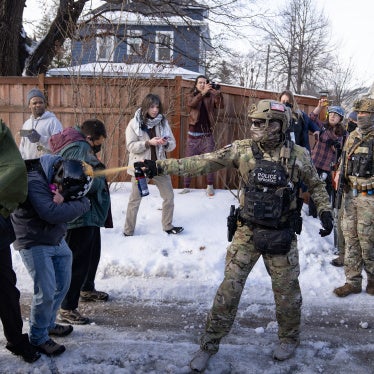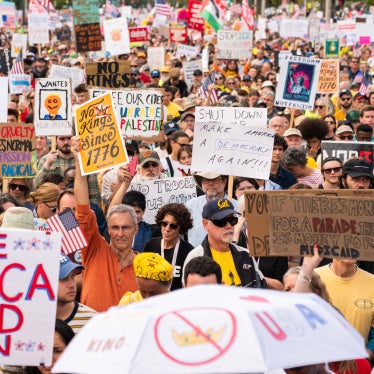Assemblymember Isaac Bryan
1020 N Street, Room 365
Chair, Elections Committee
Sacramento, CA 95814
Re: Support for Assembly Constitutional Amendment 4 (Bryan) and AB 1595 (Bryan)
Dear Assemblymember Bryan:
On behalf of Human Rights Watch, I am writing in support of ACA 4 (Bryan) and its companion bill, AB 1595 (Bryan). Human Rights Watch (“HRW”) is a non-profit, non-partisan organization established in 1978 that investigates and reports on violations of fundamental human rights in over 100 countries worldwide with the goal of securing the respect of these rights for all persons. It is the largest international human rights organization based in the United States, with offices in California. Human Rights Watch consistently advocates for the rights of people impacted by the criminal legal system. Given this interest and experience, Human Rights Watch is uniquely positioned to offer perspective regarding the human rights imperative of protecting the right to vote for all people, including those who are currently incarcerated.
For much of its history, California has taken steps to restrict the rights of people living in poverty and Black, Indigenous and other people of color. Until 1962, the state refused to ratify the 14th Amendment, which guaranteed equal protection of the law after the Civil War, and the 15th Amendment, which prohibits voting restrictions based on race. But in recent years, California provided some national leadership in ensuring the right to participate in free and fair elections. Protecting the right to vote – and ensuring that the voices of all citizens are heard, equally and without bias or favoritism, has been reflected as a core value. As the U.S. Supreme Court has ruled, restrictions on those values and that right “strike at the heart of representative government.”
And yet to this day, Californians serving a prison term are denied the right to vote. These restrictions emerged as a counterweight to efforts to expand the franchise to include people who had previously been denied both their citizenship and personhood. Various methods of disenfranchisement were enacted in many states across the nation in the aftermath of Reconstruction and the 14th Amendment, as efforts by states to restrict and suppress the voting rights of their Black citizens.
These efforts to restrict voting rights were facially race-neutral – but clear in intent, and maliciously effective. Coupled with poll taxes, literacy tests, criminalization and increasing penalties for minor crimes, the effect was exactly as intended – a dramatic and lethal restriction on the political participation of Black, Brown, Poor, and Indigenous communities.
There are states and U.S. territories that allow everyone to participate in the democratic process. Maine, Vermont, Washington D.C., and Puerto Rico all allow people in prison to vote. In fact, the United States as a whole is a dramatic outlier globally. Though detailed current information about global practices is not readily available, it is clear that the various states of the United States have among the most restrictive criminal disenfranchisement laws in the world.1 A 2016 study commissioned by Prison Reform International found there was no automatic disenfranchisement of people serving prison terms for criminal convictions in the majority of the 66 countries analyzed.
In 2020, over 5.1 million citizens in the United States were prohibited from voting because of their contact with the criminal legal system. This included over 50,000 Black people and over 77,000 Latinx people in California alone. The rates of these legal barriers to civic participation and social engagement are shocking: Black men are disenfranchised at a rate 10 times that of white men; Black women at a rate 5 times greater; Latino and Native American men at a rate double that of white men.
This disenfranchisement also disproportionately impacts our veterans, many of whom return to civilian life with visible and invisible trauma and face a likelihood of becoming unhoused and arrested that is significantly higher than the general public. California currently has nearly 7,000 veterans who are denied their voting rights because they are incarcerated.
Preserving the right to vote for all people, including those who are currently incarcerated, will have significant and positive impacts on community safety. The vast majority of people incarcerated in state prison – upward of 95% – will eventually return home. Data shows that people who vote while incarcerated and shortly thereafter are 50% less likely to ever be arrested.
California already facilitates elections in some carceral settings. People in jails have the right to vote, and some jails already serve as polling places for the people who are inside each election – including in Los Angeles County.
California voters should have the opportunity to support the right to vote, regardless of the extent of their criminal legal contact. ACA 4 will give the people of California a voice to ensure that the state is working towards being an inclusive, democratic society ACA $ is an important step to ensure non-repetition of California’s history of racially motivated disenfranchisement, voter suppression, and restriction of civil rights and participation.
Human Rights Watch strongly supports this important Assembly Constitutional Amendment 4 and its companion bill AB 1595 (Bryan) and urge your aye vote.
Sincerely,
Alison Leal Parker
Deputy Director, US Program
Human Rights Watch








